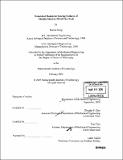Numerical models for scoring failures of flexible metal to metal face seals
Author(s)
Hong, Jinchul, 1977-
DownloadFull printable version (11.16Mb)
Other Contributors
Massachusetts Institute of Technology. Dept. of Mechanical Engineering.
Advisor
Douglas P. Hart and Tian Tian.
Terms of use
Metadata
Show full item recordAbstract
The flexible metal to metal face seals (FMMFS) has unique features including much more flexibility in the circumferential direction than in the radial direction, identical rotating and stationary seals, and a loading mechanism using elastomeric rings. This thesis work is the first attempt to explain scoring failures of this unique type of mechanical face seal. Numerical models and new scoring failure criteria were developed to explain different scoring failures of the FMMFS. The numerical models consider interactions among seal surface deflections, lubrication in the sealing band and thermal effects simultaneously. The numerical models were validated from comparisons with experiments and applied to scoring failure tests. The new scoring failure criterion successfully predicted the likelihood of scoring failures for each seal pair at given loads and speeds. From in-depth analysis of the seal pairs with low and high scoring failure speeds, it has been shown that discontinuous contact patterns can increase scoring resistance of the seal pair. These discontinuous contact patterns are created by irregular surface profiles of the sealing band. Irregular surface profiles can decrease high temperature regions by reducing superposition of temperatures and thermal conduction resistance, and finally delay scoring failures.
Description
Thesis (Ph. D.)--Massachusetts Institute of Technology, Dept. of Mechanical Engineering, 2005. Includes bibliographical references (leaves 106-108).
Date issued
2005Department
Massachusetts Institute of Technology. Department of Mechanical EngineeringPublisher
Massachusetts Institute of Technology
Keywords
Mechanical Engineering.